Report on Entrepreneurial Ventures, Impact on Economy and Society
VerifiedAdded on 2020/10/22
|15
|4284
|447
Report
AI Summary
This report delves into the multifaceted world of entrepreneurship, examining various types of ventures, including small businesses, scalable startups, large company entrepreneurship, social enterprises, lifestyle businesses, second-stage ventures, craftsman entrepreneurs, opportunist entrepreneurs, and gazelle entrepreneurs. It explores the scope of entrepreneurship, emphasizing the opportunities in small-scale businesses and the role of government policies in fostering startups. The report discusses the similarities and differences between these ventures, highlighting their contributions to economic growth, employment generation, and social development. It also analyzes the typologies of entrepreneurs, such as skeptical, copycat, serial, male, female, and research entrepreneurs. The report underscores the importance of entrepreneurs in driving innovation, creating jobs, and contributing to the overall well-being of society. This report also explains the impact of micro and small businesses on the economy and the importance of business start-ups to the growth of the social economy.

Entrepreneurship and Small
Business Management
Business Management
Paraphrase This Document
Need a fresh take? Get an instant paraphrase of this document with our AI Paraphraser

Table of Contents
INTRODUCTION...........................................................................................................................3
TASK1.............................................................................................................................................3
P1. Various types of entrepreneurial ventures and their relation with the typology of
entrepreneurship.....................................................................................................................3
P2. Explore the similarities and differences between entrepreneurial ventures....................5
TASK2.............................................................................................................................................7
P3. Interpret and asses the relevant data and statistics to illustrate the impact of micro and
small businesses on economy. ...............................................................................................7
P4. Importance of small business and business start ups to the growth of social economy...9
CONCLUSION .............................................................................................................................11
REFRENCES.................................................................................................................................12
INTRODUCTION...........................................................................................................................3
TASK1.............................................................................................................................................3
P1. Various types of entrepreneurial ventures and their relation with the typology of
entrepreneurship.....................................................................................................................3
P2. Explore the similarities and differences between entrepreneurial ventures....................5
TASK2.............................................................................................................................................7
P3. Interpret and asses the relevant data and statistics to illustrate the impact of micro and
small businesses on economy. ...............................................................................................7
P4. Importance of small business and business start ups to the growth of social economy...9
CONCLUSION .............................................................................................................................11
REFRENCES.................................................................................................................................12

⊘ This is a preview!⊘
Do you want full access?
Subscribe today to unlock all pages.

Trusted by 1+ million students worldwide
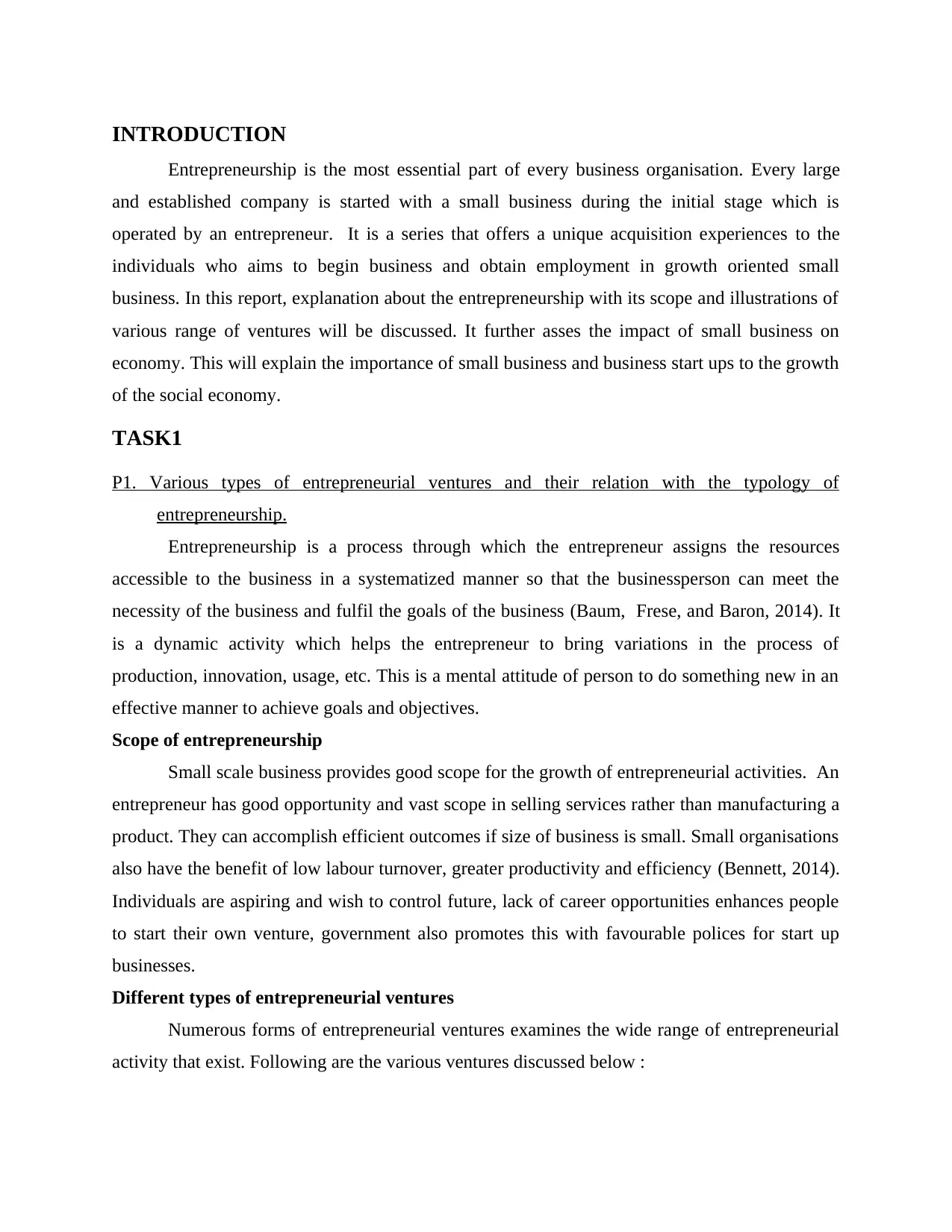
INTRODUCTION
Entrepreneurship is the most essential part of every business organisation. Every large
and established company is started with a small business during the initial stage which is
operated by an entrepreneur. It is a series that offers a unique acquisition experiences to the
individuals who aims to begin business and obtain employment in growth oriented small
business. In this report, explanation about the entrepreneurship with its scope and illustrations of
various range of ventures will be discussed. It further asses the impact of small business on
economy. This will explain the importance of small business and business start ups to the growth
of the social economy.
TASK1
P1. Various types of entrepreneurial ventures and their relation with the typology of
entrepreneurship.
Entrepreneurship is a process through which the entrepreneur assigns the resources
accessible to the business in a systematized manner so that the businessperson can meet the
necessity of the business and fulfil the goals of the business (Baum, Frese, and Baron, 2014). It
is a dynamic activity which helps the entrepreneur to bring variations in the process of
production, innovation, usage, etc. This is a mental attitude of person to do something new in an
effective manner to achieve goals and objectives.
Scope of entrepreneurship
Small scale business provides good scope for the growth of entrepreneurial activities. An
entrepreneur has good opportunity and vast scope in selling services rather than manufacturing a
product. They can accomplish efficient outcomes if size of business is small. Small organisations
also have the benefit of low labour turnover, greater productivity and efficiency (Bennett, 2014).
Individuals are aspiring and wish to control future, lack of career opportunities enhances people
to start their own venture, government also promotes this with favourable polices for start up
businesses.
Different types of entrepreneurial ventures
Numerous forms of entrepreneurial ventures examines the wide range of entrepreneurial
activity that exist. Following are the various ventures discussed below :
Entrepreneurship is the most essential part of every business organisation. Every large
and established company is started with a small business during the initial stage which is
operated by an entrepreneur. It is a series that offers a unique acquisition experiences to the
individuals who aims to begin business and obtain employment in growth oriented small
business. In this report, explanation about the entrepreneurship with its scope and illustrations of
various range of ventures will be discussed. It further asses the impact of small business on
economy. This will explain the importance of small business and business start ups to the growth
of the social economy.
TASK1
P1. Various types of entrepreneurial ventures and their relation with the typology of
entrepreneurship.
Entrepreneurship is a process through which the entrepreneur assigns the resources
accessible to the business in a systematized manner so that the businessperson can meet the
necessity of the business and fulfil the goals of the business (Baum, Frese, and Baron, 2014). It
is a dynamic activity which helps the entrepreneur to bring variations in the process of
production, innovation, usage, etc. This is a mental attitude of person to do something new in an
effective manner to achieve goals and objectives.
Scope of entrepreneurship
Small scale business provides good scope for the growth of entrepreneurial activities. An
entrepreneur has good opportunity and vast scope in selling services rather than manufacturing a
product. They can accomplish efficient outcomes if size of business is small. Small organisations
also have the benefit of low labour turnover, greater productivity and efficiency (Bennett, 2014).
Individuals are aspiring and wish to control future, lack of career opportunities enhances people
to start their own venture, government also promotes this with favourable polices for start up
businesses.
Different types of entrepreneurial ventures
Numerous forms of entrepreneurial ventures examines the wide range of entrepreneurial
activity that exist. Following are the various ventures discussed below :
Paraphrase This Document
Need a fresh take? Get an instant paraphrase of this document with our AI Paraphraser
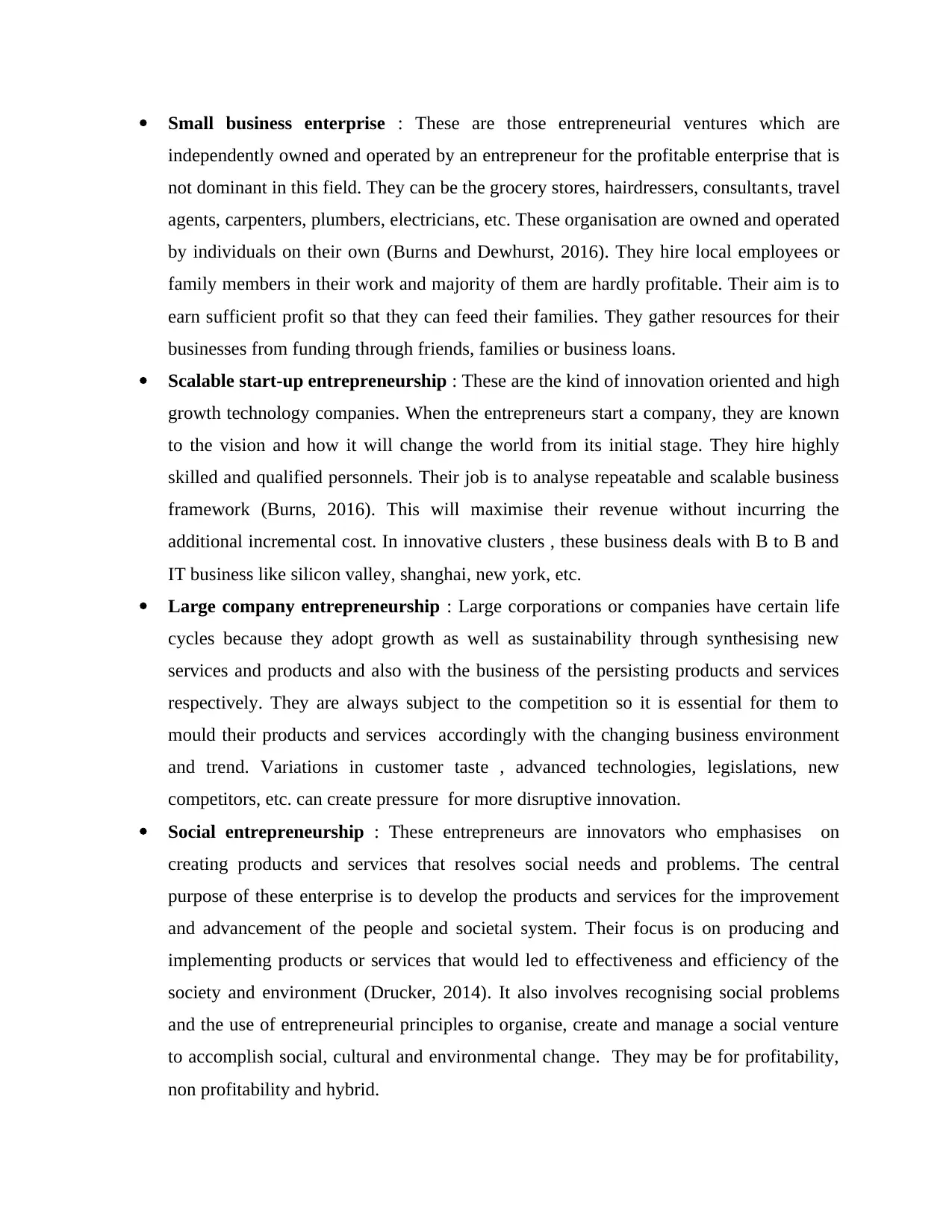
Small business enterprise : These are those entrepreneurial ventures which are
independently owned and operated by an entrepreneur for the profitable enterprise that is
not dominant in this field. They can be the grocery stores, hairdressers, consultants, travel
agents, carpenters, plumbers, electricians, etc. These organisation are owned and operated
by individuals on their own (Burns and Dewhurst, 2016). They hire local employees or
family members in their work and majority of them are hardly profitable. Their aim is to
earn sufficient profit so that they can feed their families. They gather resources for their
businesses from funding through friends, families or business loans.
Scalable start-up entrepreneurship : These are the kind of innovation oriented and high
growth technology companies. When the entrepreneurs start a company, they are known
to the vision and how it will change the world from its initial stage. They hire highly
skilled and qualified personnels. Their job is to analyse repeatable and scalable business
framework (Burns, 2016). This will maximise their revenue without incurring the
additional incremental cost. In innovative clusters , these business deals with B to B and
IT business like silicon valley, shanghai, new york, etc.
Large company entrepreneurship : Large corporations or companies have certain life
cycles because they adopt growth as well as sustainability through synthesising new
services and products and also with the business of the persisting products and services
respectively. They are always subject to the competition so it is essential for them to
mould their products and services accordingly with the changing business environment
and trend. Variations in customer taste , advanced technologies, legislations, new
competitors, etc. can create pressure for more disruptive innovation.
Social entrepreneurship : These entrepreneurs are innovators who emphasises on
creating products and services that resolves social needs and problems. The central
purpose of these enterprise is to develop the products and services for the improvement
and advancement of the people and societal system. Their focus is on producing and
implementing products or services that would led to effectiveness and efficiency of the
society and environment (Drucker, 2014). It also involves recognising social problems
and the use of entrepreneurial principles to organise, create and manage a social venture
to accomplish social, cultural and environmental change. They may be for profitability,
non profitability and hybrid.
independently owned and operated by an entrepreneur for the profitable enterprise that is
not dominant in this field. They can be the grocery stores, hairdressers, consultants, travel
agents, carpenters, plumbers, electricians, etc. These organisation are owned and operated
by individuals on their own (Burns and Dewhurst, 2016). They hire local employees or
family members in their work and majority of them are hardly profitable. Their aim is to
earn sufficient profit so that they can feed their families. They gather resources for their
businesses from funding through friends, families or business loans.
Scalable start-up entrepreneurship : These are the kind of innovation oriented and high
growth technology companies. When the entrepreneurs start a company, they are known
to the vision and how it will change the world from its initial stage. They hire highly
skilled and qualified personnels. Their job is to analyse repeatable and scalable business
framework (Burns, 2016). This will maximise their revenue without incurring the
additional incremental cost. In innovative clusters , these business deals with B to B and
IT business like silicon valley, shanghai, new york, etc.
Large company entrepreneurship : Large corporations or companies have certain life
cycles because they adopt growth as well as sustainability through synthesising new
services and products and also with the business of the persisting products and services
respectively. They are always subject to the competition so it is essential for them to
mould their products and services accordingly with the changing business environment
and trend. Variations in customer taste , advanced technologies, legislations, new
competitors, etc. can create pressure for more disruptive innovation.
Social entrepreneurship : These entrepreneurs are innovators who emphasises on
creating products and services that resolves social needs and problems. The central
purpose of these enterprise is to develop the products and services for the improvement
and advancement of the people and societal system. Their focus is on producing and
implementing products or services that would led to effectiveness and efficiency of the
society and environment (Drucker, 2014). It also involves recognising social problems
and the use of entrepreneurial principles to organise, create and manage a social venture
to accomplish social, cultural and environmental change. They may be for profitability,
non profitability and hybrid.
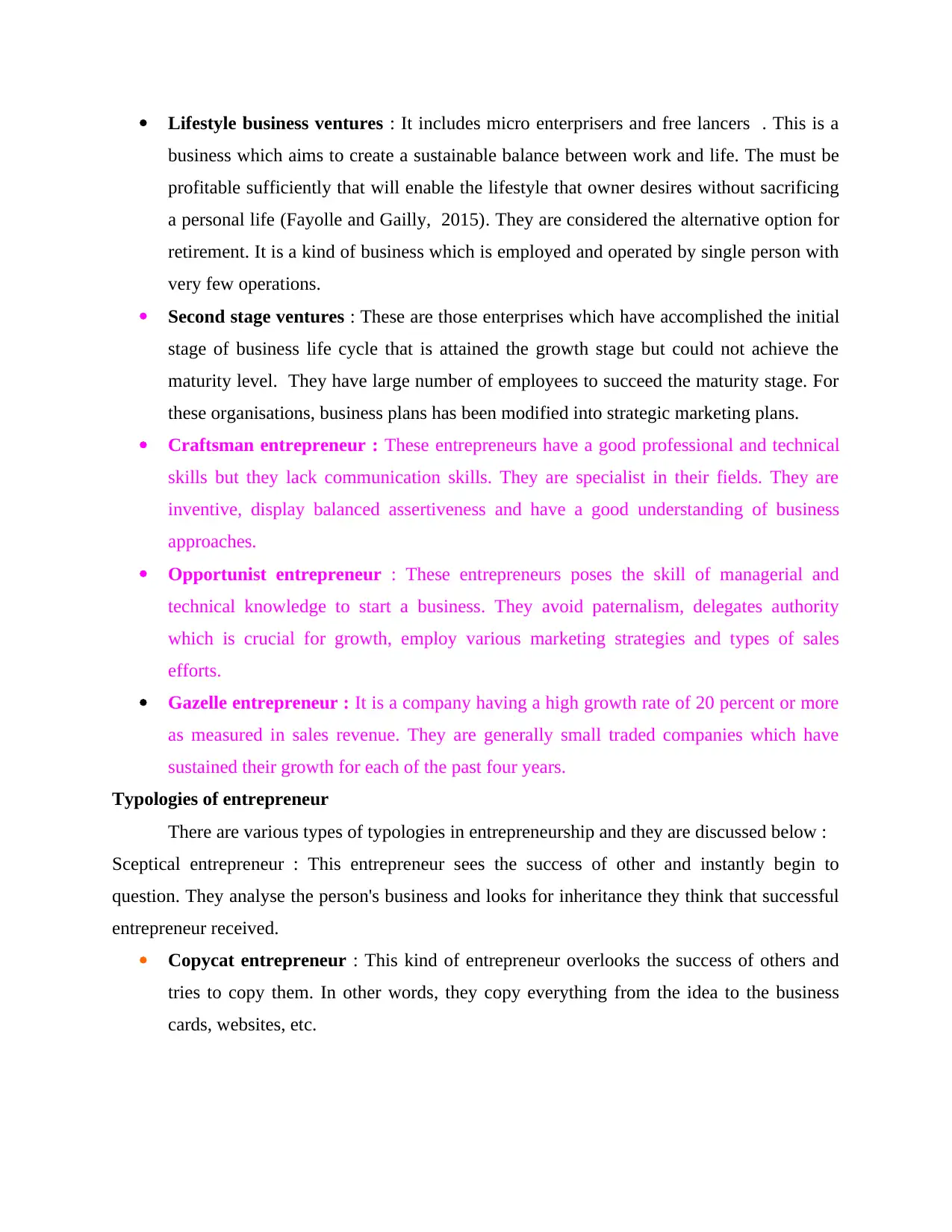
Lifestyle business ventures : It includes micro enterprisers and free lancers . This is a
business which aims to create a sustainable balance between work and life. The must be
profitable sufficiently that will enable the lifestyle that owner desires without sacrificing
a personal life (Fayolle and Gailly, 2015). They are considered the alternative option for
retirement. It is a kind of business which is employed and operated by single person with
very few operations.
Second stage ventures : These are those enterprises which have accomplished the initial
stage of business life cycle that is attained the growth stage but could not achieve the
maturity level. They have large number of employees to succeed the maturity stage. For
these organisations, business plans has been modified into strategic marketing plans.
Craftsman entrepreneur : These entrepreneurs have a good professional and technical
skills but they lack communication skills. They are specialist in their fields. They are
inventive, display balanced assertiveness and have a good understanding of business
approaches.
Opportunist entrepreneur : These entrepreneurs poses the skill of managerial and
technical knowledge to start a business. They avoid paternalism, delegates authority
which is crucial for growth, employ various marketing strategies and types of sales
efforts.
Gazelle entrepreneur : It is a company having a high growth rate of 20 percent or more
as measured in sales revenue. They are generally small traded companies which have
sustained their growth for each of the past four years.
Typologies of entrepreneur
There are various types of typologies in entrepreneurship and they are discussed below :
Sceptical entrepreneur : This entrepreneur sees the success of other and instantly begin to
question. They analyse the person's business and looks for inheritance they think that successful
entrepreneur received.
Copycat entrepreneur : This kind of entrepreneur overlooks the success of others and
tries to copy them. In other words, they copy everything from the idea to the business
cards, websites, etc.
business which aims to create a sustainable balance between work and life. The must be
profitable sufficiently that will enable the lifestyle that owner desires without sacrificing
a personal life (Fayolle and Gailly, 2015). They are considered the alternative option for
retirement. It is a kind of business which is employed and operated by single person with
very few operations.
Second stage ventures : These are those enterprises which have accomplished the initial
stage of business life cycle that is attained the growth stage but could not achieve the
maturity level. They have large number of employees to succeed the maturity stage. For
these organisations, business plans has been modified into strategic marketing plans.
Craftsman entrepreneur : These entrepreneurs have a good professional and technical
skills but they lack communication skills. They are specialist in their fields. They are
inventive, display balanced assertiveness and have a good understanding of business
approaches.
Opportunist entrepreneur : These entrepreneurs poses the skill of managerial and
technical knowledge to start a business. They avoid paternalism, delegates authority
which is crucial for growth, employ various marketing strategies and types of sales
efforts.
Gazelle entrepreneur : It is a company having a high growth rate of 20 percent or more
as measured in sales revenue. They are generally small traded companies which have
sustained their growth for each of the past four years.
Typologies of entrepreneur
There are various types of typologies in entrepreneurship and they are discussed below :
Sceptical entrepreneur : This entrepreneur sees the success of other and instantly begin to
question. They analyse the person's business and looks for inheritance they think that successful
entrepreneur received.
Copycat entrepreneur : This kind of entrepreneur overlooks the success of others and
tries to copy them. In other words, they copy everything from the idea to the business
cards, websites, etc.
⊘ This is a preview!⊘
Do you want full access?
Subscribe today to unlock all pages.

Trusted by 1+ million students worldwide
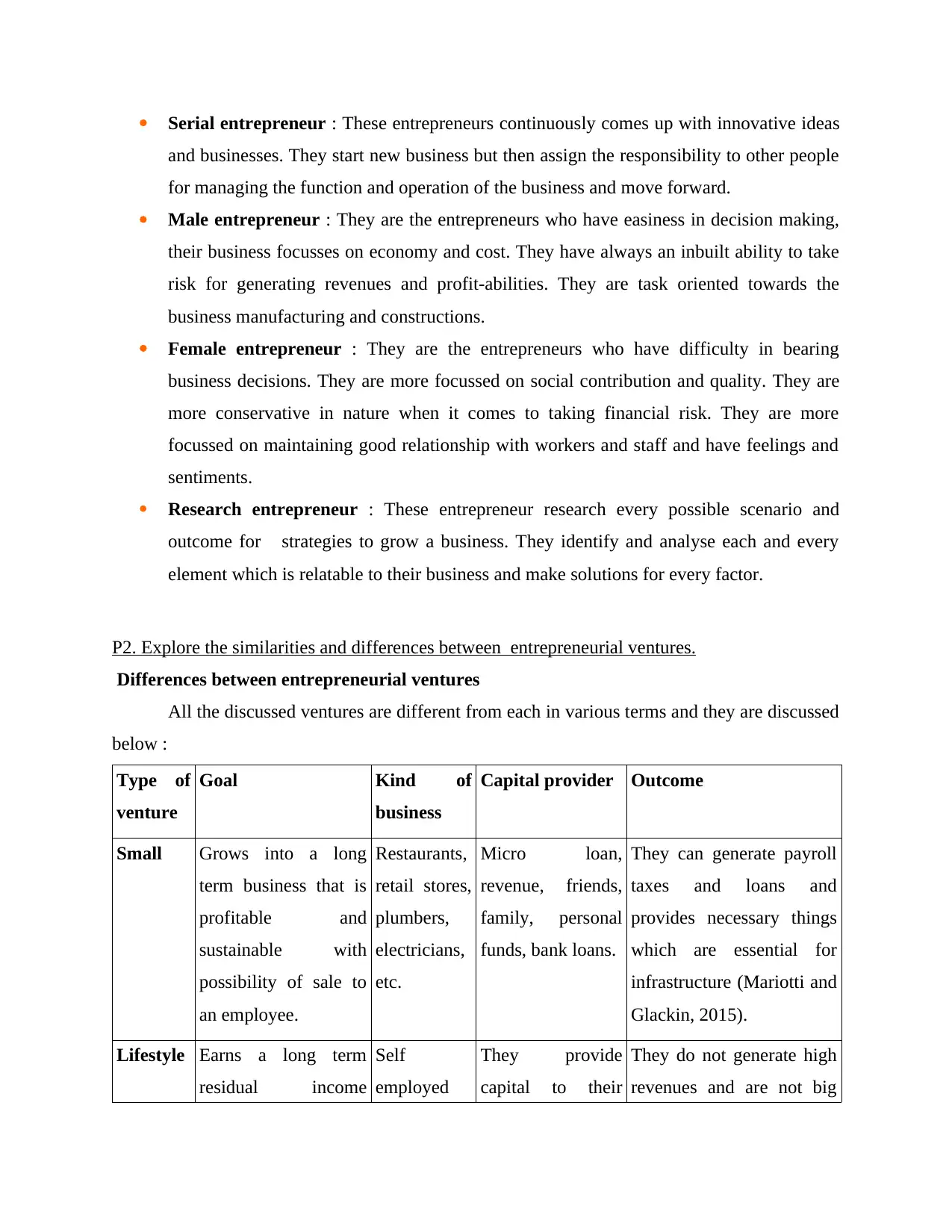
Serial entrepreneur : These entrepreneurs continuously comes up with innovative ideas
and businesses. They start new business but then assign the responsibility to other people
for managing the function and operation of the business and move forward.
Male entrepreneur : They are the entrepreneurs who have easiness in decision making,
their business focusses on economy and cost. They have always an inbuilt ability to take
risk for generating revenues and profit-abilities. They are task oriented towards the
business manufacturing and constructions.
Female entrepreneur : They are the entrepreneurs who have difficulty in bearing
business decisions. They are more focussed on social contribution and quality. They are
more conservative in nature when it comes to taking financial risk. They are more
focussed on maintaining good relationship with workers and staff and have feelings and
sentiments.
Research entrepreneur : These entrepreneur research every possible scenario and
outcome for strategies to grow a business. They identify and analyse each and every
element which is relatable to their business and make solutions for every factor.
P2. Explore the similarities and differences between entrepreneurial ventures.
Differences between entrepreneurial ventures
All the discussed ventures are different from each in various terms and they are discussed
below :
Type of
venture
Goal Kind of
business
Capital provider Outcome
Small Grows into a long
term business that is
profitable and
sustainable with
possibility of sale to
an employee.
Restaurants,
retail stores,
plumbers,
electricians,
etc.
Micro loan,
revenue, friends,
family, personal
funds, bank loans.
They can generate payroll
taxes and loans and
provides necessary things
which are essential for
infrastructure (Mariotti and
Glackin, 2015).
Lifestyle Earns a long term
residual income
Self
employed
They provide
capital to their
They do not generate high
revenues and are not big
and businesses. They start new business but then assign the responsibility to other people
for managing the function and operation of the business and move forward.
Male entrepreneur : They are the entrepreneurs who have easiness in decision making,
their business focusses on economy and cost. They have always an inbuilt ability to take
risk for generating revenues and profit-abilities. They are task oriented towards the
business manufacturing and constructions.
Female entrepreneur : They are the entrepreneurs who have difficulty in bearing
business decisions. They are more focussed on social contribution and quality. They are
more conservative in nature when it comes to taking financial risk. They are more
focussed on maintaining good relationship with workers and staff and have feelings and
sentiments.
Research entrepreneur : These entrepreneur research every possible scenario and
outcome for strategies to grow a business. They identify and analyse each and every
element which is relatable to their business and make solutions for every factor.
P2. Explore the similarities and differences between entrepreneurial ventures.
Differences between entrepreneurial ventures
All the discussed ventures are different from each in various terms and they are discussed
below :
Type of
venture
Goal Kind of
business
Capital provider Outcome
Small Grows into a long
term business that is
profitable and
sustainable with
possibility of sale to
an employee.
Restaurants,
retail stores,
plumbers,
electricians,
etc.
Micro loan,
revenue, friends,
family, personal
funds, bank loans.
They can generate payroll
taxes and loans and
provides necessary things
which are essential for
infrastructure (Mariotti and
Glackin, 2015).
Lifestyle Earns a long term
residual income
Self
employed
They provide
capital to their
They do not generate high
revenues and are not big
Paraphrase This Document
Need a fresh take? Get an instant paraphrase of this document with our AI Paraphraser

through self directed
business that is
occupied in the
founders passion and
expertise.
individual
firm, very
little
operations.
founders. job creators and maintains
balance between work and
personal life.
Social Maximises the social
welfare in society and
community.
Works to
solve global
health
issues,
educations,
etc.
Depends on types
and size of
companies and
generally funded
through charity,
donations, etc.
The have the ability to
develop social impacts and
improves lives.
Large They generates
revenue and profits
for the company and
its shareholders.
Large
established
corporations
.
They generate
capital from
revenue earned,
subsidiaries, tax
credit availed, etc.
They are recognisable
entities with good brand
image which employs large
number of people and
establishes goodwill.
Scalable Innovative young
people initiate in
generating significant
wealth for founder
and investors
(Mugler, 2017).
A company
involved in
technical
equipments,
devices or
software.
Manages fund
through agile
investment,
venture capital,
government
grants, personal
savings, friends,
family, etc.
They have the potency of
developing impact on
economy by generating
profitability and
employment opportunities.
Second
stage
Strategic growth
through expansion,
identifying different
markets, etc.
A kind of
business that
has operated
for more
then 3 years
with greater
Growth
investments,
banks, etc. are the
sources of
generating
High growth
opportunities , employment
generations, etc. have the
ability to contribute in
economy and also
business that is
occupied in the
founders passion and
expertise.
individual
firm, very
little
operations.
founders. job creators and maintains
balance between work and
personal life.
Social Maximises the social
welfare in society and
community.
Works to
solve global
health
issues,
educations,
etc.
Depends on types
and size of
companies and
generally funded
through charity,
donations, etc.
The have the ability to
develop social impacts and
improves lives.
Large They generates
revenue and profits
for the company and
its shareholders.
Large
established
corporations
.
They generate
capital from
revenue earned,
subsidiaries, tax
credit availed, etc.
They are recognisable
entities with good brand
image which employs large
number of people and
establishes goodwill.
Scalable Innovative young
people initiate in
generating significant
wealth for founder
and investors
(Mugler, 2017).
A company
involved in
technical
equipments,
devices or
software.
Manages fund
through agile
investment,
venture capital,
government
grants, personal
savings, friends,
family, etc.
They have the potency of
developing impact on
economy by generating
profitability and
employment opportunities.
Second
stage
Strategic growth
through expansion,
identifying different
markets, etc.
A kind of
business that
has operated
for more
then 3 years
with greater
Growth
investments,
banks, etc. are the
sources of
generating
High growth
opportunities , employment
generations, etc. have the
ability to contribute in
economy and also

then 20%
growth rate.
capitals. generation of profits.
Similarities of the various ventures
Apart from differences, there are various similarities for these ventures which are
discussed below :
Every venture has the definite set of vision and mission for which they have to work.
They are able to generate revenues and profits which is essential for the existence of
every company.
Apart from those organisations which are operated by individuals, all other companies
generates large scale of employment opportunities.
All the entrepreneurs bear the risk factor without which the success is not possible.
Though large and small ventures are different from each other, still they share similar set
of motives that they both work for the attainment of customer satisfaction.
Lifestyle and scalable ventures shares a similar set of objectives of earning profits
through their sales which will help in building financial stability and goodwill.
Similarities between small, medium, large and
gazelle ventures
These organisations or ventures have
significant contribution in socio
economic development. They generates
employment opportunities, contributes
in economic growth , development and
transformation of society.
Apart from their contribution to socio
economic development, they have a
similarity of same factors which affect
them like environment, culture,
location, individual characteristics, etc.
Also the owner or entrepreneurs tends
to poses the similar and definite set of
similar characteristics or traits, skills
growth rate.
capitals. generation of profits.
Similarities of the various ventures
Apart from differences, there are various similarities for these ventures which are
discussed below :
Every venture has the definite set of vision and mission for which they have to work.
They are able to generate revenues and profits which is essential for the existence of
every company.
Apart from those organisations which are operated by individuals, all other companies
generates large scale of employment opportunities.
All the entrepreneurs bear the risk factor without which the success is not possible.
Though large and small ventures are different from each other, still they share similar set
of motives that they both work for the attainment of customer satisfaction.
Lifestyle and scalable ventures shares a similar set of objectives of earning profits
through their sales which will help in building financial stability and goodwill.
Similarities between small, medium, large and
gazelle ventures
These organisations or ventures have
significant contribution in socio
economic development. They generates
employment opportunities, contributes
in economic growth , development and
transformation of society.
Apart from their contribution to socio
economic development, they have a
similarity of same factors which affect
them like environment, culture,
location, individual characteristics, etc.
Also the owner or entrepreneurs tends
to poses the similar and definite set of
similar characteristics or traits, skills
⊘ This is a preview!⊘
Do you want full access?
Subscribe today to unlock all pages.

Trusted by 1+ million students worldwide
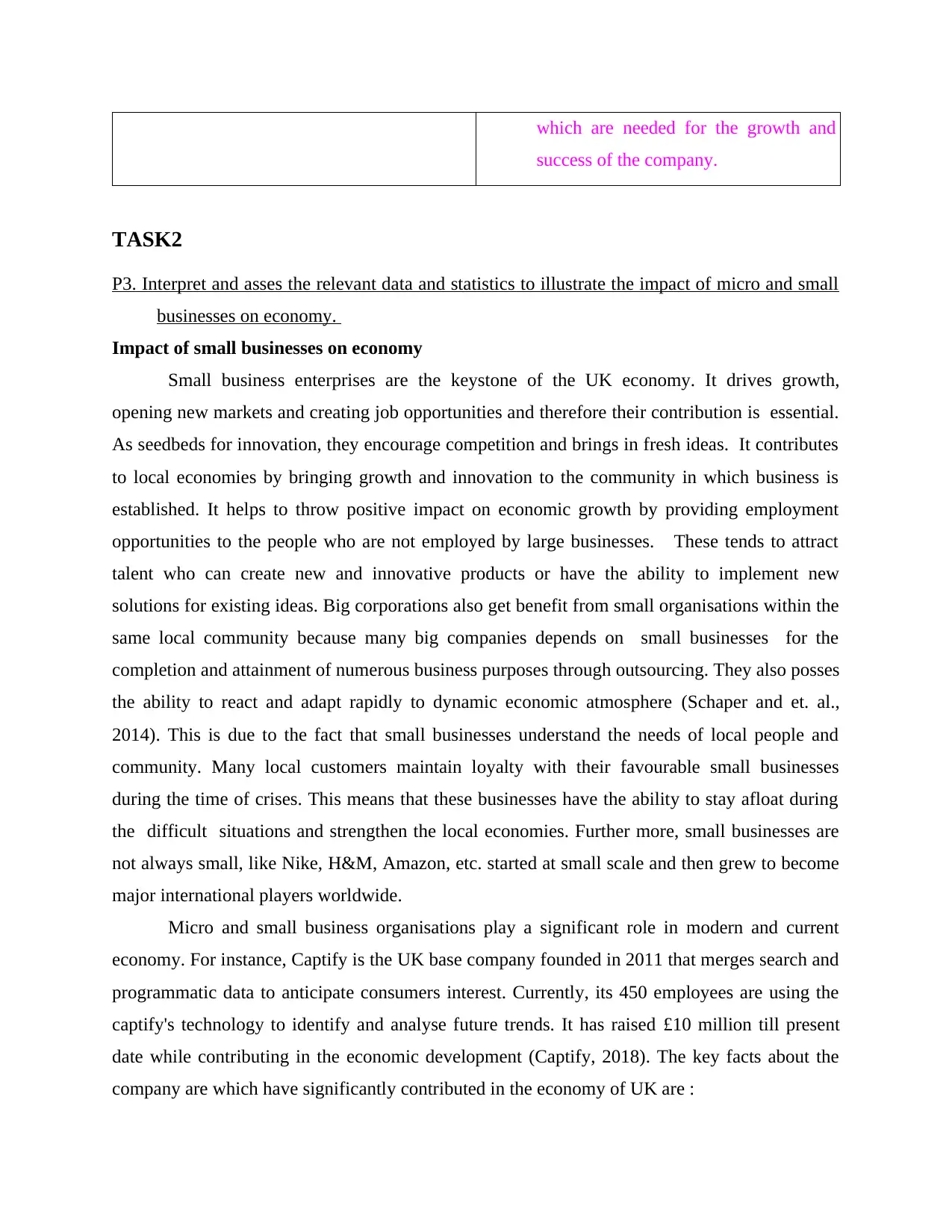
which are needed for the growth and
success of the company.
TASK2
P3. Interpret and asses the relevant data and statistics to illustrate the impact of micro and small
businesses on economy.
Impact of small businesses on economy
Small business enterprises are the keystone of the UK economy. It drives growth,
opening new markets and creating job opportunities and therefore their contribution is essential.
As seedbeds for innovation, they encourage competition and brings in fresh ideas. It contributes
to local economies by bringing growth and innovation to the community in which business is
established. It helps to throw positive impact on economic growth by providing employment
opportunities to the people who are not employed by large businesses. These tends to attract
talent who can create new and innovative products or have the ability to implement new
solutions for existing ideas. Big corporations also get benefit from small organisations within the
same local community because many big companies depends on small businesses for the
completion and attainment of numerous business purposes through outsourcing. They also posses
the ability to react and adapt rapidly to dynamic economic atmosphere (Schaper and et. al.,
2014). This is due to the fact that small businesses understand the needs of local people and
community. Many local customers maintain loyalty with their favourable small businesses
during the time of crises. This means that these businesses have the ability to stay afloat during
the difficult situations and strengthen the local economies. Further more, small businesses are
not always small, like Nike, H&M, Amazon, etc. started at small scale and then grew to become
major international players worldwide.
Micro and small business organisations play a significant role in modern and current
economy. For instance, Captify is the UK base company founded in 2011 that merges search and
programmatic data to anticipate consumers interest. Currently, its 450 employees are using the
captify's technology to identify and analyse future trends. It has raised £10 million till present
date while contributing in the economic development (Captify, 2018). The key facts about the
company are which have significantly contributed in the economy of UK are :
success of the company.
TASK2
P3. Interpret and asses the relevant data and statistics to illustrate the impact of micro and small
businesses on economy.
Impact of small businesses on economy
Small business enterprises are the keystone of the UK economy. It drives growth,
opening new markets and creating job opportunities and therefore their contribution is essential.
As seedbeds for innovation, they encourage competition and brings in fresh ideas. It contributes
to local economies by bringing growth and innovation to the community in which business is
established. It helps to throw positive impact on economic growth by providing employment
opportunities to the people who are not employed by large businesses. These tends to attract
talent who can create new and innovative products or have the ability to implement new
solutions for existing ideas. Big corporations also get benefit from small organisations within the
same local community because many big companies depends on small businesses for the
completion and attainment of numerous business purposes through outsourcing. They also posses
the ability to react and adapt rapidly to dynamic economic atmosphere (Schaper and et. al.,
2014). This is due to the fact that small businesses understand the needs of local people and
community. Many local customers maintain loyalty with their favourable small businesses
during the time of crises. This means that these businesses have the ability to stay afloat during
the difficult situations and strengthen the local economies. Further more, small businesses are
not always small, like Nike, H&M, Amazon, etc. started at small scale and then grew to become
major international players worldwide.
Micro and small business organisations play a significant role in modern and current
economy. For instance, Captify is the UK base company founded in 2011 that merges search and
programmatic data to anticipate consumers interest. Currently, its 450 employees are using the
captify's technology to identify and analyse future trends. It has raised £10 million till present
date while contributing in the economic development (Captify, 2018). The key facts about the
company are which have significantly contributed in the economy of UK are :
Paraphrase This Document
Need a fresh take? Get an instant paraphrase of this document with our AI Paraphraser
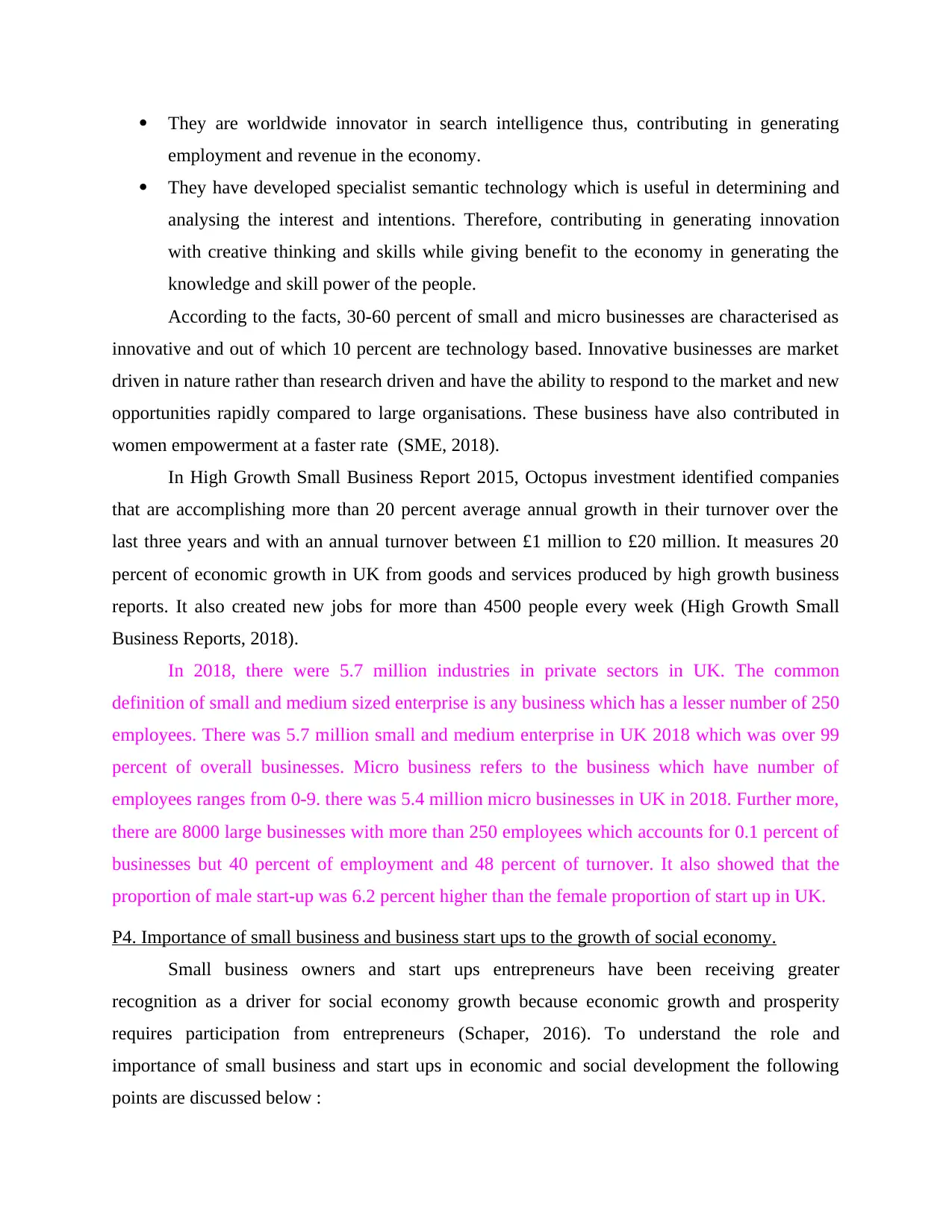
They are worldwide innovator in search intelligence thus, contributing in generating
employment and revenue in the economy.
They have developed specialist semantic technology which is useful in determining and
analysing the interest and intentions. Therefore, contributing in generating innovation
with creative thinking and skills while giving benefit to the economy in generating the
knowledge and skill power of the people.
According to the facts, 30-60 percent of small and micro businesses are characterised as
innovative and out of which 10 percent are technology based. Innovative businesses are market
driven in nature rather than research driven and have the ability to respond to the market and new
opportunities rapidly compared to large organisations. These business have also contributed in
women empowerment at a faster rate (SME, 2018).
In High Growth Small Business Report 2015, Octopus investment identified companies
that are accomplishing more than 20 percent average annual growth in their turnover over the
last three years and with an annual turnover between £1 million to £20 million. It measures 20
percent of economic growth in UK from goods and services produced by high growth business
reports. It also created new jobs for more than 4500 people every week (High Growth Small
Business Reports, 2018).
In 2018, there were 5.7 million industries in private sectors in UK. The common
definition of small and medium sized enterprise is any business which has a lesser number of 250
employees. There was 5.7 million small and medium enterprise in UK 2018 which was over 99
percent of overall businesses. Micro business refers to the business which have number of
employees ranges from 0-9. there was 5.4 million micro businesses in UK in 2018. Further more,
there are 8000 large businesses with more than 250 employees which accounts for 0.1 percent of
businesses but 40 percent of employment and 48 percent of turnover. It also showed that the
proportion of male start-up was 6.2 percent higher than the female proportion of start up in UK.
P4. Importance of small business and business start ups to the growth of social economy.
Small business owners and start ups entrepreneurs have been receiving greater
recognition as a driver for social economy growth because economic growth and prosperity
requires participation from entrepreneurs (Schaper, 2016). To understand the role and
importance of small business and start ups in economic and social development the following
points are discussed below :
employment and revenue in the economy.
They have developed specialist semantic technology which is useful in determining and
analysing the interest and intentions. Therefore, contributing in generating innovation
with creative thinking and skills while giving benefit to the economy in generating the
knowledge and skill power of the people.
According to the facts, 30-60 percent of small and micro businesses are characterised as
innovative and out of which 10 percent are technology based. Innovative businesses are market
driven in nature rather than research driven and have the ability to respond to the market and new
opportunities rapidly compared to large organisations. These business have also contributed in
women empowerment at a faster rate (SME, 2018).
In High Growth Small Business Report 2015, Octopus investment identified companies
that are accomplishing more than 20 percent average annual growth in their turnover over the
last three years and with an annual turnover between £1 million to £20 million. It measures 20
percent of economic growth in UK from goods and services produced by high growth business
reports. It also created new jobs for more than 4500 people every week (High Growth Small
Business Reports, 2018).
In 2018, there were 5.7 million industries in private sectors in UK. The common
definition of small and medium sized enterprise is any business which has a lesser number of 250
employees. There was 5.7 million small and medium enterprise in UK 2018 which was over 99
percent of overall businesses. Micro business refers to the business which have number of
employees ranges from 0-9. there was 5.4 million micro businesses in UK in 2018. Further more,
there are 8000 large businesses with more than 250 employees which accounts for 0.1 percent of
businesses but 40 percent of employment and 48 percent of turnover. It also showed that the
proportion of male start-up was 6.2 percent higher than the female proportion of start up in UK.
P4. Importance of small business and business start ups to the growth of social economy.
Small business owners and start ups entrepreneurs have been receiving greater
recognition as a driver for social economy growth because economic growth and prosperity
requires participation from entrepreneurs (Schaper, 2016). To understand the role and
importance of small business and start ups in economic and social development the following
points are discussed below :
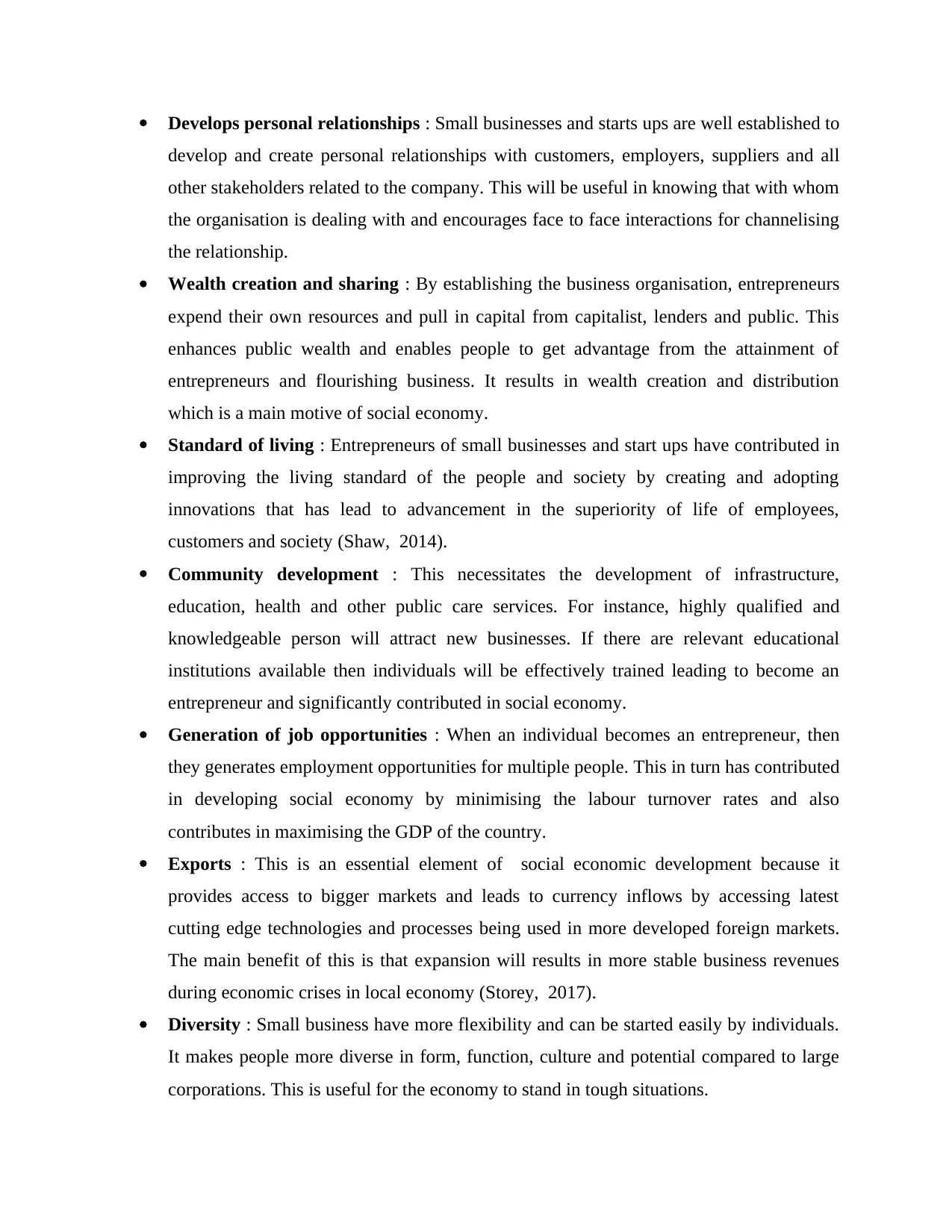
Develops personal relationships : Small businesses and starts ups are well established to
develop and create personal relationships with customers, employers, suppliers and all
other stakeholders related to the company. This will be useful in knowing that with whom
the organisation is dealing with and encourages face to face interactions for channelising
the relationship.
Wealth creation and sharing : By establishing the business organisation, entrepreneurs
expend their own resources and pull in capital from capitalist, lenders and public. This
enhances public wealth and enables people to get advantage from the attainment of
entrepreneurs and flourishing business. It results in wealth creation and distribution
which is a main motive of social economy.
Standard of living : Entrepreneurs of small businesses and start ups have contributed in
improving the living standard of the people and society by creating and adopting
innovations that has lead to advancement in the superiority of life of employees,
customers and society (Shaw, 2014).
Community development : This necessitates the development of infrastructure,
education, health and other public care services. For instance, highly qualified and
knowledgeable person will attract new businesses. If there are relevant educational
institutions available then individuals will be effectively trained leading to become an
entrepreneur and significantly contributed in social economy.
Generation of job opportunities : When an individual becomes an entrepreneur, then
they generates employment opportunities for multiple people. This in turn has contributed
in developing social economy by minimising the labour turnover rates and also
contributes in maximising the GDP of the country.
Exports : This is an essential element of social economic development because it
provides access to bigger markets and leads to currency inflows by accessing latest
cutting edge technologies and processes being used in more developed foreign markets.
The main benefit of this is that expansion will results in more stable business revenues
during economic crises in local economy (Storey, 2017).
Diversity : Small business have more flexibility and can be started easily by individuals.
It makes people more diverse in form, function, culture and potential compared to large
corporations. This is useful for the economy to stand in tough situations.
develop and create personal relationships with customers, employers, suppliers and all
other stakeholders related to the company. This will be useful in knowing that with whom
the organisation is dealing with and encourages face to face interactions for channelising
the relationship.
Wealth creation and sharing : By establishing the business organisation, entrepreneurs
expend their own resources and pull in capital from capitalist, lenders and public. This
enhances public wealth and enables people to get advantage from the attainment of
entrepreneurs and flourishing business. It results in wealth creation and distribution
which is a main motive of social economy.
Standard of living : Entrepreneurs of small businesses and start ups have contributed in
improving the living standard of the people and society by creating and adopting
innovations that has lead to advancement in the superiority of life of employees,
customers and society (Shaw, 2014).
Community development : This necessitates the development of infrastructure,
education, health and other public care services. For instance, highly qualified and
knowledgeable person will attract new businesses. If there are relevant educational
institutions available then individuals will be effectively trained leading to become an
entrepreneur and significantly contributed in social economy.
Generation of job opportunities : When an individual becomes an entrepreneur, then
they generates employment opportunities for multiple people. This in turn has contributed
in developing social economy by minimising the labour turnover rates and also
contributes in maximising the GDP of the country.
Exports : This is an essential element of social economic development because it
provides access to bigger markets and leads to currency inflows by accessing latest
cutting edge technologies and processes being used in more developed foreign markets.
The main benefit of this is that expansion will results in more stable business revenues
during economic crises in local economy (Storey, 2017).
Diversity : Small business have more flexibility and can be started easily by individuals.
It makes people more diverse in form, function, culture and potential compared to large
corporations. This is useful for the economy to stand in tough situations.
⊘ This is a preview!⊘
Do you want full access?
Subscribe today to unlock all pages.

Trusted by 1+ million students worldwide
1 out of 15
Related Documents
Your All-in-One AI-Powered Toolkit for Academic Success.
+13062052269
info@desklib.com
Available 24*7 on WhatsApp / Email
![[object Object]](/_next/static/media/star-bottom.7253800d.svg)
Unlock your academic potential
Copyright © 2020–2026 A2Z Services. All Rights Reserved. Developed and managed by ZUCOL.




